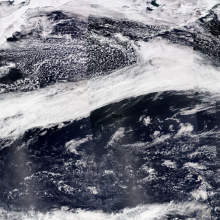Key Climate Observations Restored with Deployment of KEO Buoy
March 31, 2022: The Kuroshio Extension Observatory (KEO) moored buoy was successfully deployed by NOAA PMEL and partners, renewing an ongoing OceanSITES time series that began almost 18 years ago. First deployed in 2004, its time series was disrupted by the COVID pandemic. KEO collects vital data in the Kuroshio Extension recirculation gyre, a region known to affect the development of storms over the North Pacific before they reach the United States.

The KEO moored buoy (pink star) was deployed just in time to observe an intense atmospheric river (as shown in the satellite image) that connected the western Pacific to the east and brought stormy weather and heavy precipitation to the Pacific Northwest. Click on image to see full image. Cloud image created from worldview.earthdata.nasa.gov
The KEO Climate Station deployment aboard the R/V Kiayo Maru #1 took about 6 hours. Data from this key climate observation moored buoy can be used to help improve weather and storm forecasts, inform climate projections and verify satellite products and models. Photo Credit: Patrick Berk/University of Washington and NOAA PMEL


